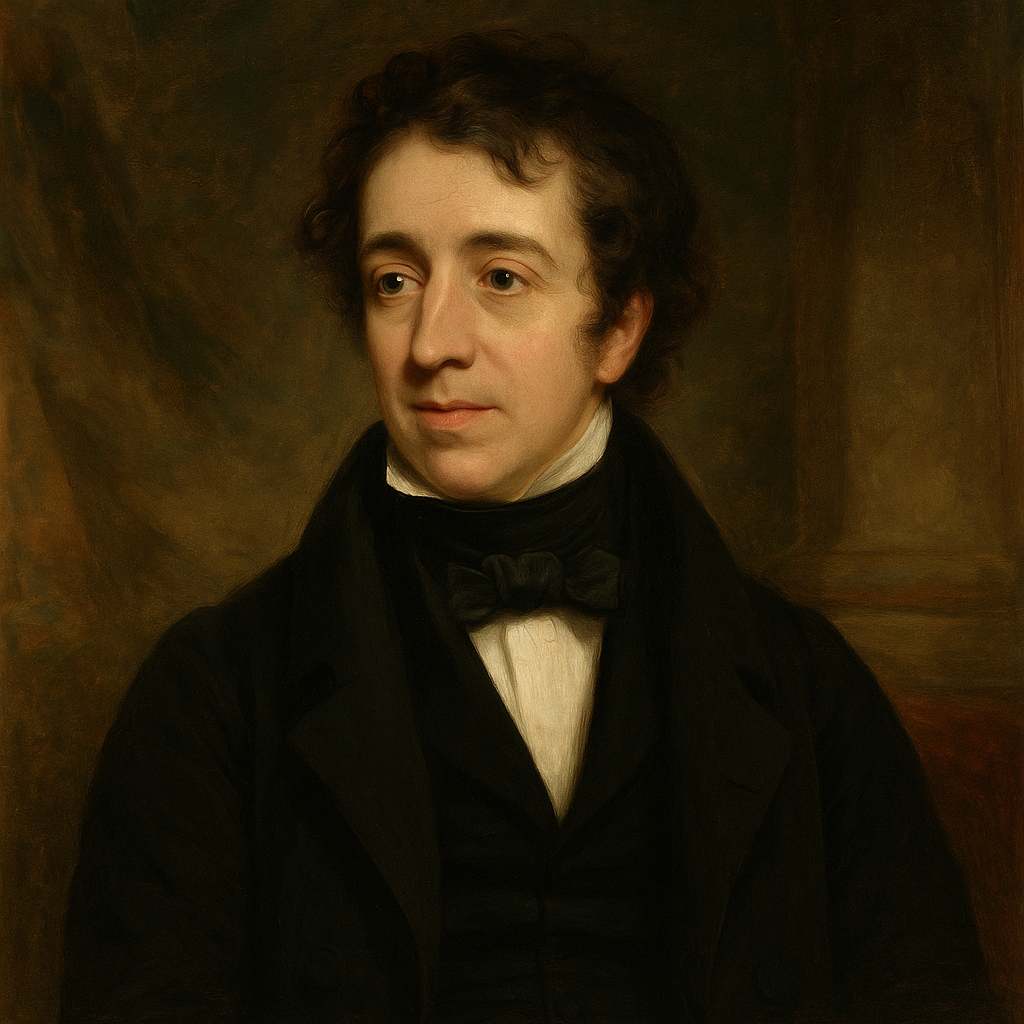Jenny Kiss’d Me
Leigh Hunt
1784 to 1859

Jenny kissed me when we met,
Jumping from the chair she sat in;
Time, you thief, who love to get
Sweets into your list, put that in:
Say I'm weary, say I'm sad,
Say that health and wealth have missed me,
Say I'm growing old, but add,
Jenny kissed me.
Leigh Hunt's Jenny Kiss’d Me
Leigh Hunt’s short lyric poem Jenny Kiss’d Me is a celebration of a fleeting yet profound moment of human connection. Composed in 1838, the poem reflects Hunt's Romantic sensibilities, emphasizing emotion, spontaneity, and the individual’s subjective experience. The poem's brevity and simplicity belie its depth, as it explores themes of love, memory, and the defiance of temporal decay. Using a tight metrical structure, rhythmic cadences, and direct address, Hunt crafts a vivid snapshot of joy and intimacy.
Structure and Form
The poem is a perfect example of lyric poetry, characterized by its brevity, personal tone, and emotional focus. It is composed of eight lines of rhymed iambic tetrameter, a meter that provides a flowing, song-like rhythm befitting its celebratory tone. The rhyme scheme follows an ABABCDCD pattern, reinforcing the unity and coherence of the poem. The conversational style and natural flow of the lines lend immediacy and intimacy to the speaker’s voice.
Analysis of Themes and Literary Devices
-
Theme of Time and Memory
- The speaker explicitly addresses Time in the third line, calling it a "thief." This personification highlights the transient nature of life and the inevitability of aging. By stealing "sweets," Time is depicted as a force that erodes the joys and pleasures of life. However, the speaker commands Time to preserve this specific memory—Jenny’s kiss—asserting that even as time diminishes other aspects of life, this moment of connection will endure.
- The final couplet reinforces this idea, juxtaposing the speaker’s weariness, sadness, and aging with the immutable memory of the kiss. The imperative "add" signifies the speaker's insistence that the vitality of this moment be immortalized.
-
Theme of Love and Human Connection
- The kiss is not portrayed as romantic but rather as an expression of affection, warmth, and spontaneity. Jenny’s act of “jumping from the chair” emphasizes the joy and impulsiveness of the moment. Her action suggests an authentic, uncalculated gesture of love, underscoring the value of such genuine human interactions.
- The simplicity of the declaration "Jenny kissed me" carries profound emotional weight. It functions as a refrain that encapsulates the heart of the poem, affirming the power of a single moment to transcend the hardships of life.
-
Literary Devices
- Personification: Time is personified as a thief, emphasizing its agency in taking away life’s pleasures and moments of joy. This device also dramatizes the conflict between the ephemeral and the eternal.
- Imagery: The image of Jenny "jumping from the chair" creates a vivid, kinetic picture of enthusiasm and affection, grounding the poem in a specific, relatable moment.
- Repetition: The phrase "say" in the final stanza structures the speaker’s lament over life’s trials, creating a rhythm that mirrors the repetitive nature of human struggles.
- Contrast: The poem contrasts the inevitability of decline (sadness, weariness, aging) with the lasting significance of love and joy, illustrating how small acts of kindness can defy life’s hardships.
Historical and Biographical Context
Hunt was a contemporary of major Romantic poets such as Shelley and Keats, and his work often reflected the Romantic ethos of valuing individual experience and emotional authenticity. This particular poem is thought to have been inspired by Jane Welsh Carlyle, wife of the historian Thomas Carlyle, who reportedly greeted Hunt with a kiss during a visit. The personal nature of this anecdote lends a layer of sincerity and intimacy to the poem, making it resonate as a celebration of real human warmth.
Conclusion
Jenny Kiss’d Me is a masterful encapsulation of a fleeting moment’s lasting impact. Through its direct language, rhythmic grace, and vivid imagery, Leigh Hunt affirms the enduring power of affection and connection in the face of time’s inexorable passage. The poem invites readers to cherish small, joyful moments, suggesting that such memories possess a timeless vitality that outlives the trials of life. Hunt’s lyrical expression, though concise, resonates universally, celebrating the profound in the seemingly ordinary.
This text was generated by AI and is for reference only. Learn more
Want to join the discussion? Reopen or create a unique username to comment. No personal details required!



Comments
No comments yet. Be the first to comment!